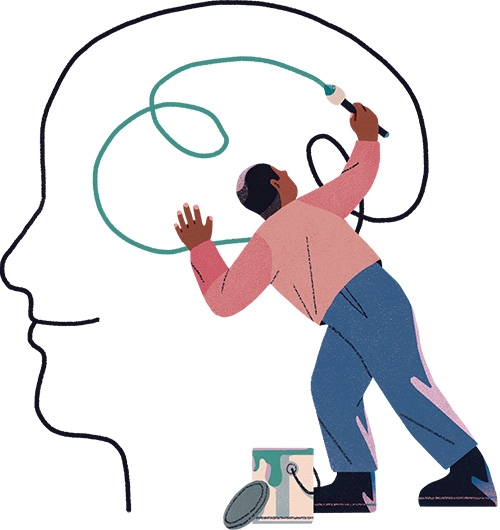Should I stay or should I go?
Jennifer Allford - 20 November 2023

BACK IN 1982, MICK JONES OF THE CLASH BELTED out “Should I stay, or should I go?” articulating a question that comes to all of us at some point or another. Jones insists the song isn’t about a romantic relationship or the Clash (he left the British band a couple of years later) but rather, an attempt to write a classic song.
He nailed it. The punk anthem and its soul-searching question endure, from plot twists in the Netflix show Stranger Things to playlists of young and old around the world. Should I stay in this job? This house? This situation? Or should I try something new? Take that opportunity? Give that new idea a shot?
Asking — or singing — the question is easy. Answering it can be another matter. How do you know when to go with the flow or change course? If indecision’s bugging you, we offer suggestions and personal reflections from three Augustana alumni who have faced their own forks in the road.
Change Your Mind
➤ Medical doctor, podcaster and illusionist Lalit Chawla, ’91 BSc, ’01 MD, has had his own share of plot twists, from veering away from medical school to work as an illusionist and later, when his mom was dying of cancer, going back to school to become a doctor.
“When I was 20, I had a desire to go into medicine and, at the same time, I was doing magic as a hobby,” says Chawla. He loved being an illusionist and enjoyed considerable success for several years. “There was a creative aspect, and a huge performance aspect. You’re learning to move, you’re learning to vocalize and address an audience.”
But when his mom was diagnosed with breast cancer when he was 26, he found himself re-evaluating his career choice. “It reminded me why I was interested in medicine in the first place, and I thought, how am I contributing to making the world a better place? How am I helping?”
So Chawla followed his U of A Augustana science degree with a medical degree from the Faculty of Medicine & Dentistry. Once he became a physician, he discovered he could use his skills as an illusionist to help his peers and their patients. “I started using magic as a tool to teach other doctors how you can use it in a clinical setting to make patients and children feel more comfortable,” he says.
Reflecting on his own experience, Chawla suggests that contribution is the first thing to consider when one is contemplating a change. Sometimes, he says, people “just keep going on the same treadmill. They don’t ever think, ‘Am I enjoying this? Is this fuelling me?’ People have a tremendous desire to grow and to contribute. And when people are not fulfilled in their lives, they are not growing or contributing.”

Once you’ve examined how a change could boost your contribution to society, Chawla suggests tallying the amount of time it will take, and a great deal depends on what stage of life you are in, he says. “As you get older there are different demands and different ideas and desires.”
Next, examine the energy it would take to stay put versus that of moving on. Ask yourself how much energy you may have to put into a new venture. “Everywhere I go — when I’m speaking at conferences or
whatever — the biggest thing people want to know is, ‘How do I get more energy?’ Physically, mentally and spiritually. People want more energy to participate in life, in their relationships, in their career and hobbies.”
Finally, examine the resources that changing things up will require, and of course think about your yearning to make a change. “If you have a tremendous desire, you can find time, you can find energy, you can find resources,” he says. “Sometimes people want a change because whatever they’re doing, they don’t desire it anymore. It doesn’t fulfill them. They may be contributing to themselves and other people, but it may have become so routine and boring that they desire something else that gives them more energy.”
Listen to Your Gut
➤ Last summer, veterinarian Dayle Poitras-Oster decided to leave a job she loved at a mixed animal clinic in Drayton Valley, Alta., to move to Edmonton to start a new role as an instructor teaching at NAIT. Poitras-Oster, a proud member of the Métis Nation of Alberta, studied science at the University of Alberta’s Augustana Campus and graduated from the Western College of Veterinary Medicine (WCVM) in 2021.
“My whole life was set up in Drayton Valley,” she says. “I had a mortgage and a horse, and I thought maybe I shouldn’t move because I have all these things. It’s a pain, for lack of a better word, to uproot my life and move again. But my gut really told me that I wanted something different at this point in my life.”
While she’s all for “listening to your gut” and “trusting your feelings”, she also cautions against getting carried away. “I would never recommend somebody go into millions of dollars of debt to go travel or something. Things need to make sense, and you can talk those through with people and come up with a bit of a plan and make sure it logistically works. But at the same time you have to be willing to be flexible and pursue what makes you happy.”
From representing Indigenous students on the WCVM’s Students’ Association, and promoting Métis, First Nations and Inuit representation on different veterinary committees, to buying a beloved horse when she couldn’t really afford it, Poitras-Oster has learned that change is constant — and she embraces it. “In our field we say, ‘you have to learn how to get comfortable being uncomfortable,’ ” she says. “You’re never going to be 100 per cent comfortable.”
She’s also learned to talk openly about her mental health and go to therapy regularly. “It’s preventative medicine. You’re preventing sadness. You’re preventing depression. You’re preventing stress and you’re learning how to work through those things in a healthy way.”
Now that she’s settling into her new home and job, Poitras-Oster will continue her work advocating for Indigenous colleagues and encouraging other people from Indigenous communities to consider veterinary medicine.
“Growing up in rural Alberta, I didn’t even know that I could be a veterinarian. I didn’t even know that was really a job. I just assumed I would go and work in the oil field.” Instead, she explored different interests at Augustana, including drama, sociology and Indigenous studies, and settled on biology before going off to veterinary school.
“I think it’s important that, if you have the opportunity, you widen your scope, that you take those experiences and those chances to better yourself. You shouldn’t let things stand in your way,” she says. “You can always make changes in your life. The worst thing you can do is say ‘no’ to really good opportunities.”
Pay Attention to Your Dreams
➤ Wassim Daoud, ’08 BSc, ’18 MBA, says it takes him a long time to give up on something. The senior director of Global Software and Lifecycle Services at Honeywell has found that often, if he gives a problem a little more time, the solution is “right around the corner.” Sometimes, he says, “persevering a little bit longer gets you the fruitful results you’re hoping for and where you want to go.”
But other times it’s clear you have to switch it up. “It takes courage to change direction. Sometimes, you’ve been persevering for so long and eventually you realize this might be the wrong direction. Being a little bit more self-aware, you’ll recognize that you need to change.”
But how do you know? For Daoud, a dream he had one night helped him decide on a massive shift and symbolized what his next step should be. He was working as an electrical engineer and climbing the ranks at an automation company in his native Syria. He started as a project manager and moved up quickly to managing multimillion-dollar projects. But he soon realized that he had more potential, and he needed a change in order to grow. “I realized that I’ll probably just plateau at a certain level within this particular field,” he says.
He was wrestling with the idea of moving to Canada, studying computing science and merging that expertise with electrical engineering. But leaving his country, his family and his career was a “very tough call.”
Until one night he dreamt he was dangling in a well and grasping on to the top. “I look down and it’s dark and deep and I can’t see anything. I can’t even see the bottom of it,” he says. “I look up past my hands holding on to the rim, and I see the light. All I have to do is lift myself up so I can be within the light. Otherwise, if I keep hanging on I’m going to get tired and fall into the well. My subconscious was telling me the right answer.”
When he woke up, he decided to leave Syria. Daoud, who says he “barely spoke English” emigrated to Canada, graduated with a BSc in computing science from Augustana Campus, and later did a MBA in strategic management and innovation at North Campus. “Merging both fields, I found a niche and it’s working out very well for me in a way that’s giving me an edge in the industry,” he says.
Daoud has worked with Honeywell for 15 years, in increasingly more complex roles. Now living in Houston, Daoud has taken up triathlons and gourmet cooking, pursuits which underscore the need for perseverance — like pushing through the pain of a cramp to finish the race, or throwing in the towel and throwing out dinner when the meal doesn’t quite work out.
“Ninety per cent of the dishes turn out exactly how I want them but sometimes it’s, ‘What the heck did I just create?’ Then I have to draw the line and say that’s enough trying. I’ve done my best and I need to stop. I’ll have to change directions and focus on something else.”
Know That Things Have a Way of Working Out
➤ Sometimes you have to cope with someone else’s decisions. The Clash fired lead guitarist Mick Jones in 1983. “We were just all fed up with each other,” Jones told Rolling Stone magazine in 2013. “The bigger it got, the more difficult it became. We battled through constant issues ... We could have dealt with it better, in hindsight.”
While precious few of us have played lead guitar in an iconic punk band, most of us have wished for the benefit of hindsight while grappling with or dealing with the aftermath of a decision. But here’s the thing: most of the time, even if you make the “wrong call,” things tend to work out.
For his part, Jones went on to make more music with loads of other bands after the Clash, and he’s still working in the business. “We became friends again after the group broke up and continued that way for the rest of the time,” he says. “That was more important to us than the band.”
This article first appeared in the Winter 2023/24 edition of the Augustana alumni magazine, Circle.